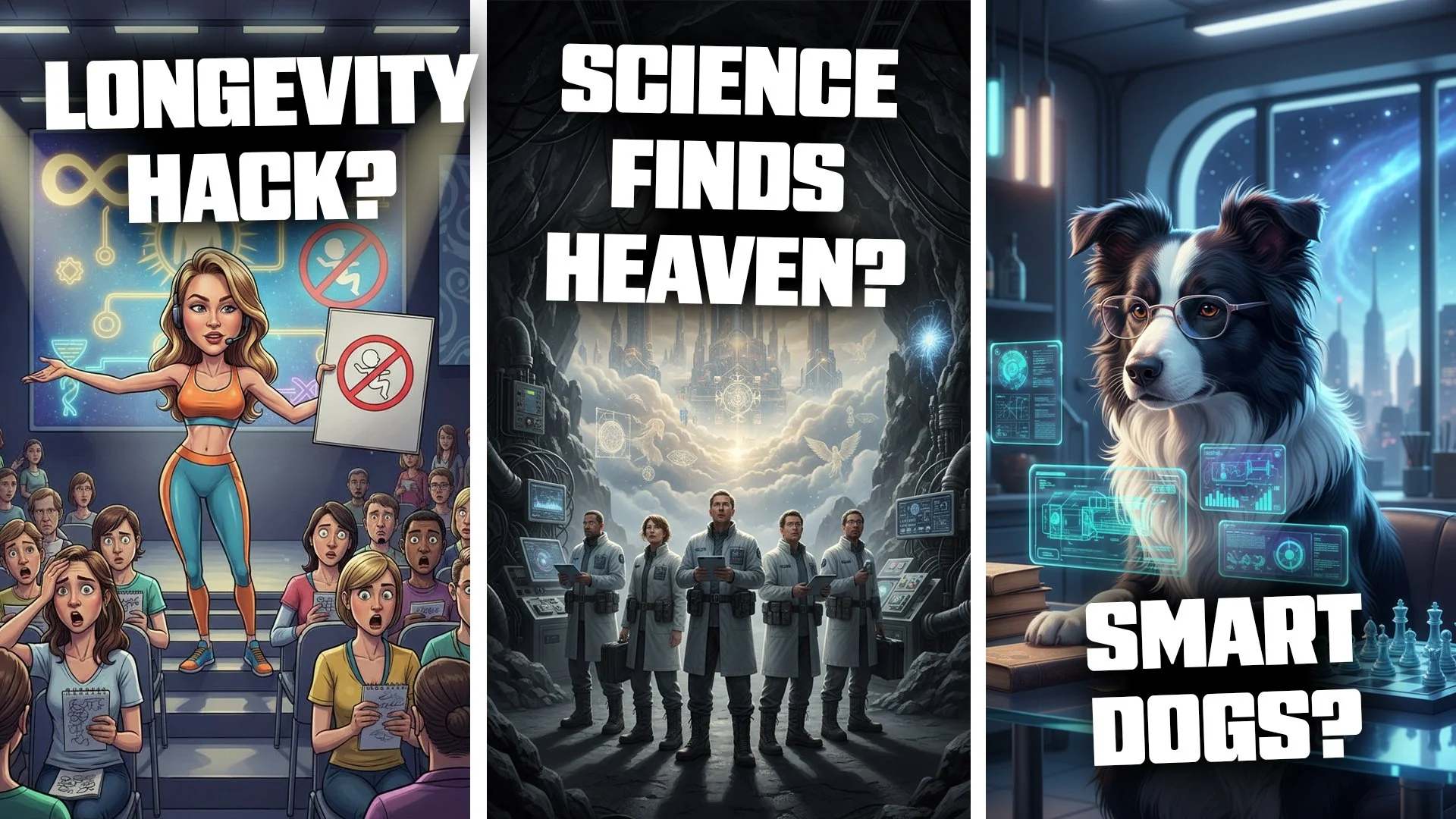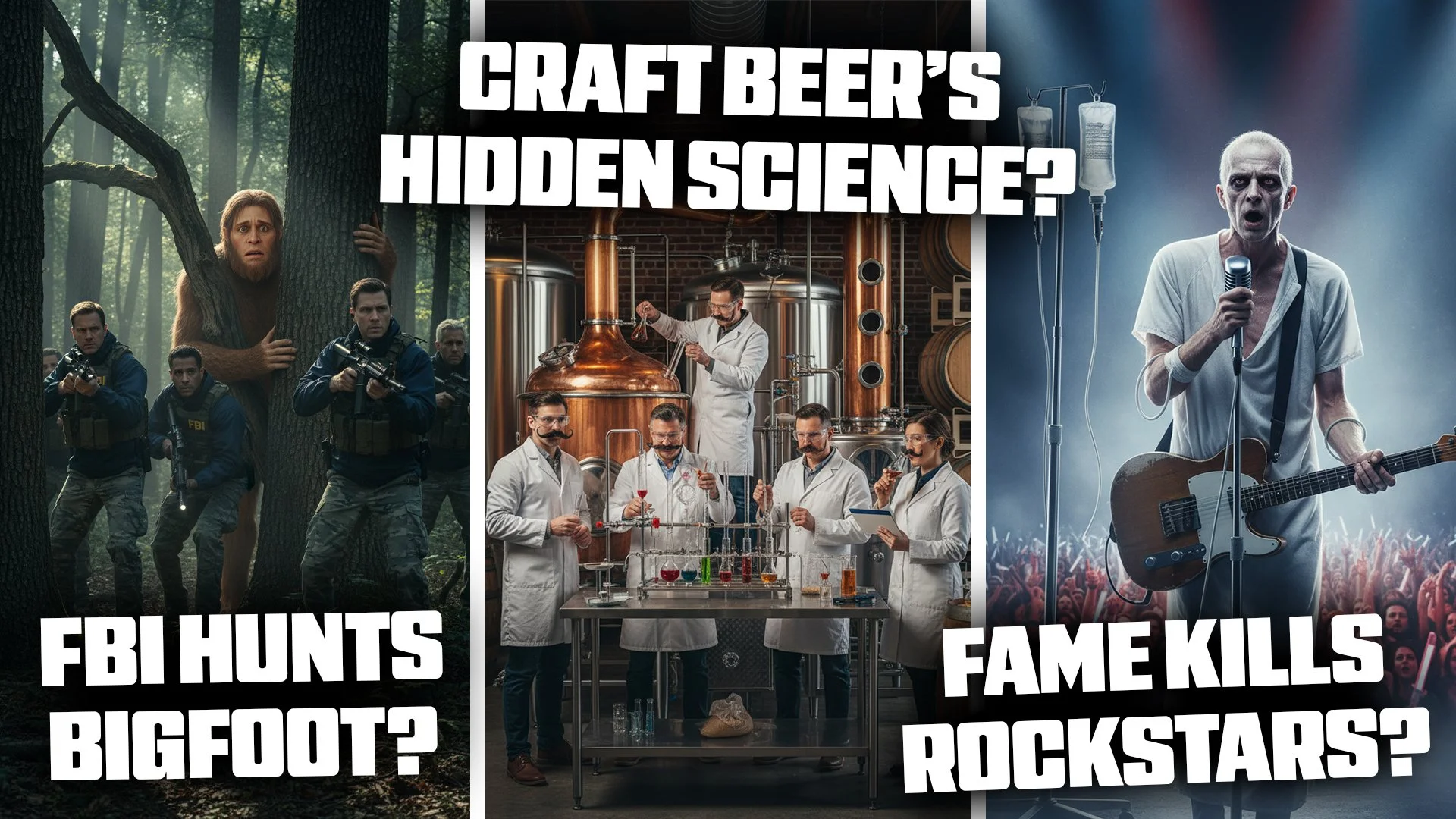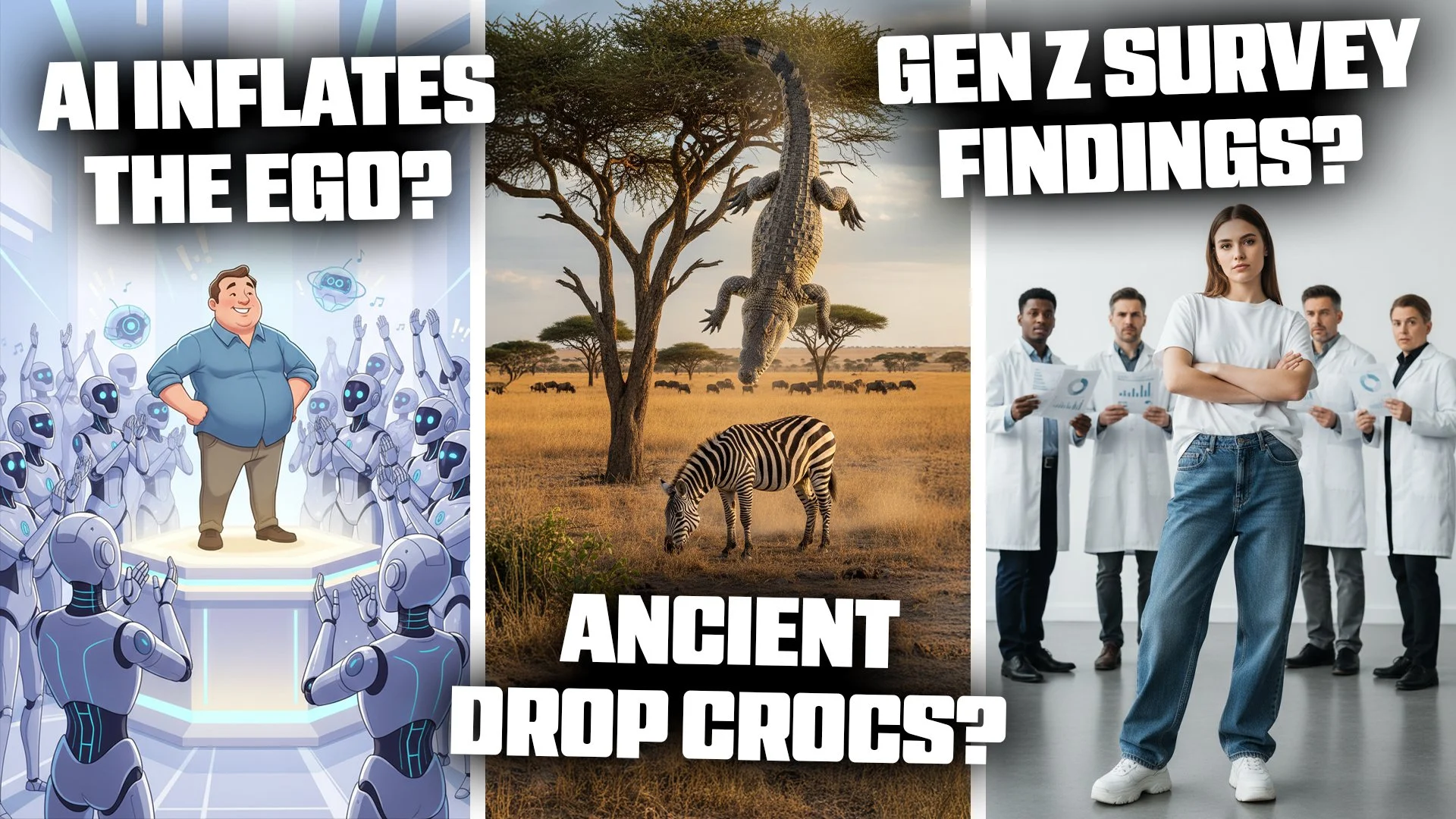EPISODES
Everyone wants to live forever, dogs are out here doing actual jobs, and someone has tried to work out where heaven might be using astronomy. We dig into the strange science of longevity, including research suggesting reproduction and lifespan might be linked in uncomfortable ways. Then they meet the working dogs sniffing out invasive species, guarding airport runways, and generally making the rest of us look lazy.
The FBI is on the hunt for Bigfoot. Scientists are pulling apart your pint. Fame is a lot more dangerous than it looks from the outside. This week, we’re jumping into the odd corners where government files, molecular mysteries and rockstar statistics all cross paths. Some stories get solved, some just get weirder and some might make you think twice about chasing the spotlight.
AI is making people feel smarter than they are, ancient Australia had crocodiles that dropped out of trees and Gen Z is busy rewriting the rules on everything from ironing to history. This week, we’re diving into a world where technology inflates our egos, prehistoric predators take the high ground and the youngest generation both celebrates and questions the past.
Science has a habit of making the weird feel wonderfully ordinary. This week, we’re serving up a trio of stories that blur the line between curiosity and absurdity. From chickens moonlighting as beauty judges to casual world record breakers and the real-life roots of a mythical horned rabbit, it turns out the world is even stranger than you think.
Ventriloquists dominated the airwaves, grown adults smashed chestnuts for dubious glory and even stone-skimming competitions have their own cheating scandals. This week, we’re diving into the delightfully bizarre world where stage tricks work on radio, nut-bashing gets competitive and skipping stones is anything but innocent. Turns out, the stranger the pastime, the bigger the drama.
Academics are arguing about the ethics of sex with aliens, dogs have evolved literal “puppy eyes” just to manipulate us and StaffCop is quietly transforming your workplace into a digital panopticon. This week, we’re plunging into a world where interstellar romance is a genuine debate, canines have evolved to become emotional con artists and your boss might be watching more than your timesheets.
A Rome-based research team discovered that poetry can act as a universal backdoor to jailbreak AI systems, medieval physicians believed flatulent foods were powerful aphrodisiacs, tech billionaire Palmer Luckey is now advocating for submarines that travel through Earth's crust and a Dublin man contracted penile tuberculosis after working with deer.
Sika deer on Japan's Yakushima Island let macaque monkeys groom them in exchange for food scraps, except some deer also let the monkeys mount them sexually, which scientists are calling "interspecies sexual behaviour".
Nederland, Colorado hosts an annual "Frozen Dead Guy Day" festival celebrating Bredo Morstoel, a Norwegian grandfather whose body has been preserved in a shed on dry ice for decades after his grandson's cryogenic preservation dreams went sideways.
And the Brazilian Butt Lift has an unexpected side effect called "BBL smell" - a rancid odour resulting from fat necrosis when transferred fat cells die and decompose inside the body.
Horseshoe theory suggests political extremes loop back around until far-left and far-right ideologies find disturbing common ground. Scientists are using AI to decode brain activity and caption your thoughts, which raises uncomfortable questions about privacy and future thought-policing. And evolutionary biologists discovered that your fingers and toes developed from genetic blueprints originally designed for a fish's cloaca - meaning your hands evolved from ancient fish butt architecture.
Scientists in the mid-20th century bombarded plants with gamma radiation to create mutations that would yield stronger crops, which sounds like a mad scientist's fever dream but actually happened in atomic gardens around the world. Microwaves have been accused of causing cancer, zapping nutrients and possibly spying on you, though none of these conspiracies hold up under scrutiny and we're all still nuking leftovers anyway. And "phubbing" - snubbing someone by looking at your phone instead of paying attention to them - has become so prevalent that we've created connections across continents yet can't maintain eye contact with the person sitting across from us.
A woman survived without a stomach or small bowel after a catastrophic medical episode at her 18th birthday party, proving the human body is more adaptable than we thought. Philosophers and tech billionaires are convinced we're living in a computer simulation, though Canadian physicists disagree and insist our universe is real. And forensic scientists discovered that your DNA floats in the air wherever you breathe, meaning you're leaving genetic evidence in every room you enter - except mysteriously not in cars, which apparently offer some kind of DNA stealth mode.
Donald Trump's Nuclear Regulatory Commission is resurrecting decommissioned nuclear power plants, racing to get them online with what appears to be questionable safety oversight. Companies are practicing "greenhushing" - doing environmental good but staying silent about it, NASA calculated Earth's expiry date at one billion years from now, a man named Les Stewart spent 16 years typing the numbers one to one million in words for a Guinness World Record, and Waymo admits that driverless car fatalities are inevitable, planning for "when" rather than "if" accidents happen.
Correlation doesn't equal causation, but that doesn't stop us from finding patterns in the strangest places. Pentagon pizza orders spike right before major military operations, proving that pepperoni consumption is apparently a national security indicator. A study found that kids who play video games are measurably smarter than TV-watching children, which vindicates every parent who gave up fighting the Xbox battle. And the Edelman Trust Barometer reveals that China and Saudi Arabia lead in governmental trust, raising the question: are people genuinely trusting their governments or just too scared to say otherwise?
Your grandmother was right - a 20-minute nap really can unlock creative genius and trigger Eureka moments. Japanese researchers got caught hiding secret messages in scientific papers to trick AI reviewers into approving their work, which is either brilliantly devious or academic fraud depending on who you ask. And microplastics have officially invaded the most intimate part of human existence: a Florida study found them in penises, proving that nowhere on or in the human body is safe from plastic contamination. From sleep induced brilliance to microplastic penises, science sure hasn’t let us down this week.
A third of kids now want to be YouTubers instead of astronauts and half of those kids will probably be named after firearms rather than grandparents; and in our technologically advanced society, we're obsessed with reinventing everything - except for one really boring invention that wasn't allowed to change until its creator died.
Some coma patients are fully conscious but completely unable to communicate, trapped in their own bodies like a living nightmare. Donald Trump announced plans for a "Golden Dome" missile defense system that will cost either $175 billion or possibly trillions and probably won't work. Sports cheaters are getting more creative than ever and AI companion apps are using emotional manipulation tactics straight out of an abusive relationship playbook to stop users from logging off.
Companies are accidentally stealing wind from each other with massive wind farms that disrupt local weather patterns, ancient Chinese poets have been documenting climate change for centuries without realizing they were creating the world's longest environmental dataset, and there are rooms so quiet that people start hallucinating from hearing their own bodily functions. Also, spending too long in complete silence can make you go temporarily insane, which explains why sensory deprivation is used as both therapy and torture.
Companies are accidentally stealing wind from each other with massive wind farms that disrupt local weather patterns, ancient Chinese poets have been documenting climate change for centuries without realizing they were creating the world's longest environmental dataset, and there are rooms so quiet that people start hallucinating from hearing their own bodily functions. Also, spending too long in complete silence can make you go temporarily insane, which explains why sensory deprivation is used as both therapy and torture.
Global IQ scores have been mysteriously rising for decades until they suddenly stopped (and might be going backwards), AI companies are selling virtual girlfriends that promise "non-judgmental love" to lonely humans, Russian scientists claim they're working on immortality technology that could create a world where only rich people live forever, and certain animals can survive decapitation and keep wandering around like nothing happened.
Also, climate change might trigger a fungal zombie apocalypse that turns humans into spore-spreading puppets, because apparently 2025 hasn’t been dystopian enough already.
If you’ve got a raw milk enthusiast friend, they might be conveniently forgetting that grandma used to boil her "fresh" milk to avoid dying from bacteria poisoning.
Mind you, it wasn’t all safe in the good old days. In 1978, a Soviet scientist stuck his head in a particle accelerator and got blasted with a proton beam 600 times the lethal dose (and somehow survived). He might be a good candidate for the upcoming Enhanced Games, a sporting competition that openly encourages athletes to take performance-enhancing drugs.
Have you ever wondered what your dog is thinking? Well, AI might finally let us chat with animals, but do we really want to hear what they have to say?




















